Abstract
A random sample of 617 primiparas was identified from birth notifications over a 12 month period and 534 of these were interviewed four weeks after confinement. Those breast feeding at the time of interview were contacted again at four months and those still breast feeding then were contacted at six and a half months. Duration of breast feeding was found to be significantly associated with five interassociated personal characteristics of the mother and with specific aspects of her knowledge and attitudes regarding breast feeding. In hospital the timing of the first breast feed and difficulties with subsequent feeds, were important indicators; while at home the use of additional formula feeds was associated with a reduced prevalence of breast feeding by 18 weeks. A combination of older maternal age at confinement and older age at leaving school showed a tenfold increase of prevalence rates in breast feeding at 16 weeks between groups of mothers. The use of these two factors alone may thus help doctors, midwives, and health visitors in assessing the risk of premature termination of breast feeding and in planning programmes of preventive care.
Full text
PDF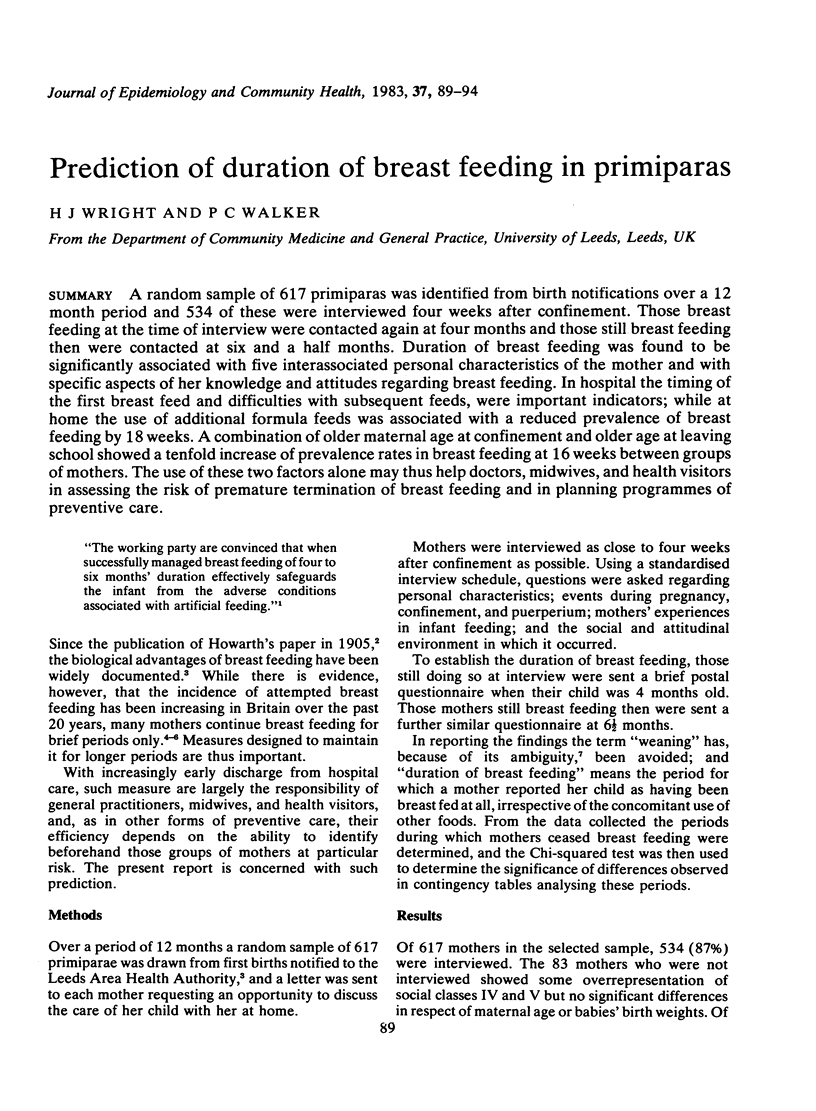
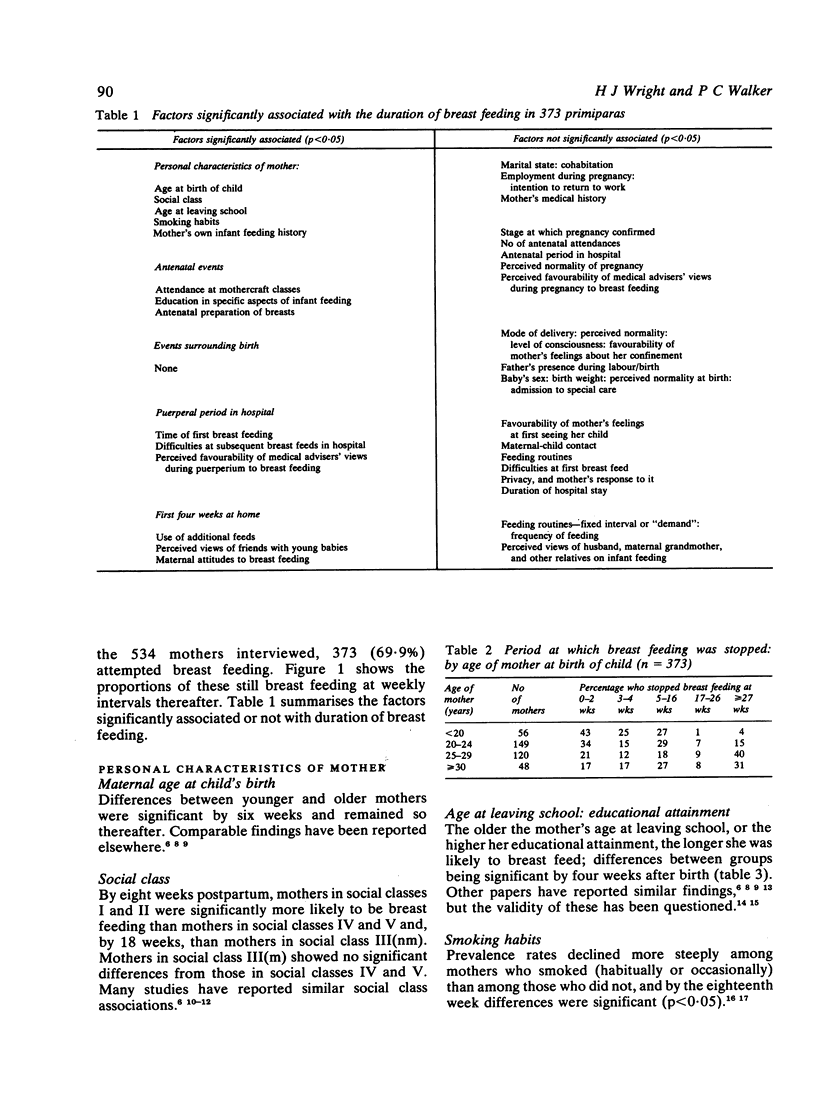
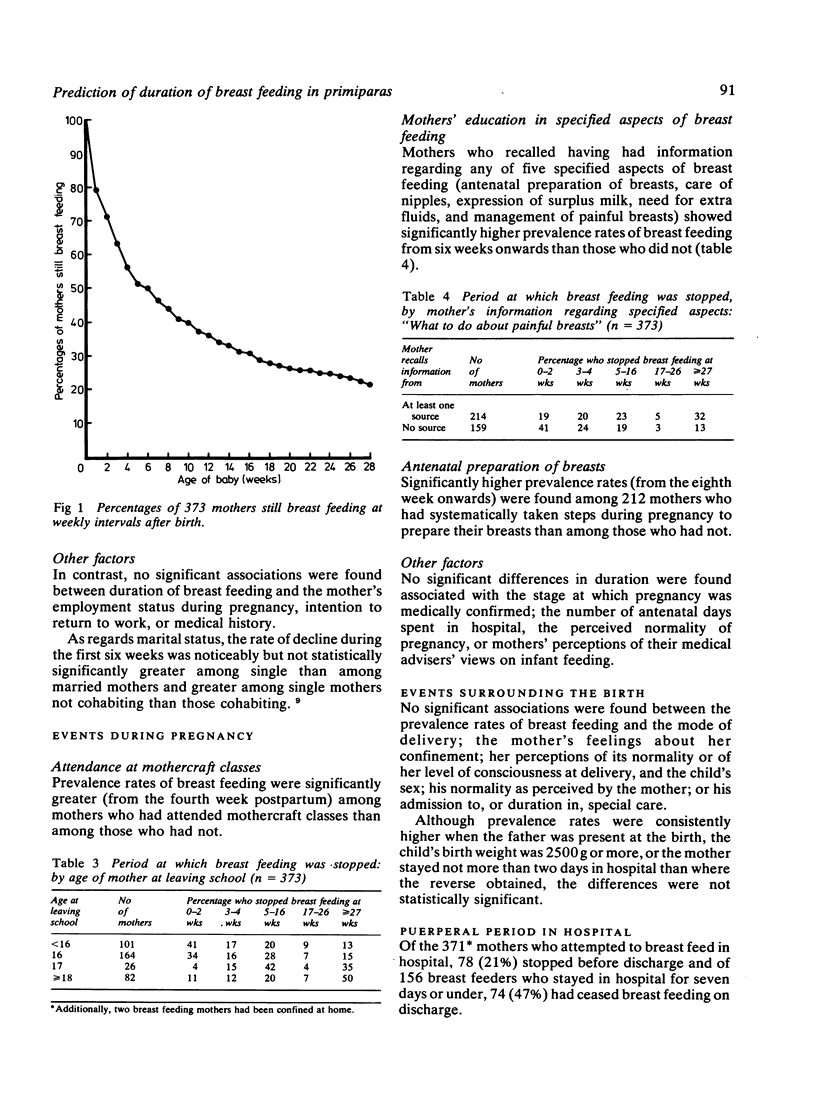

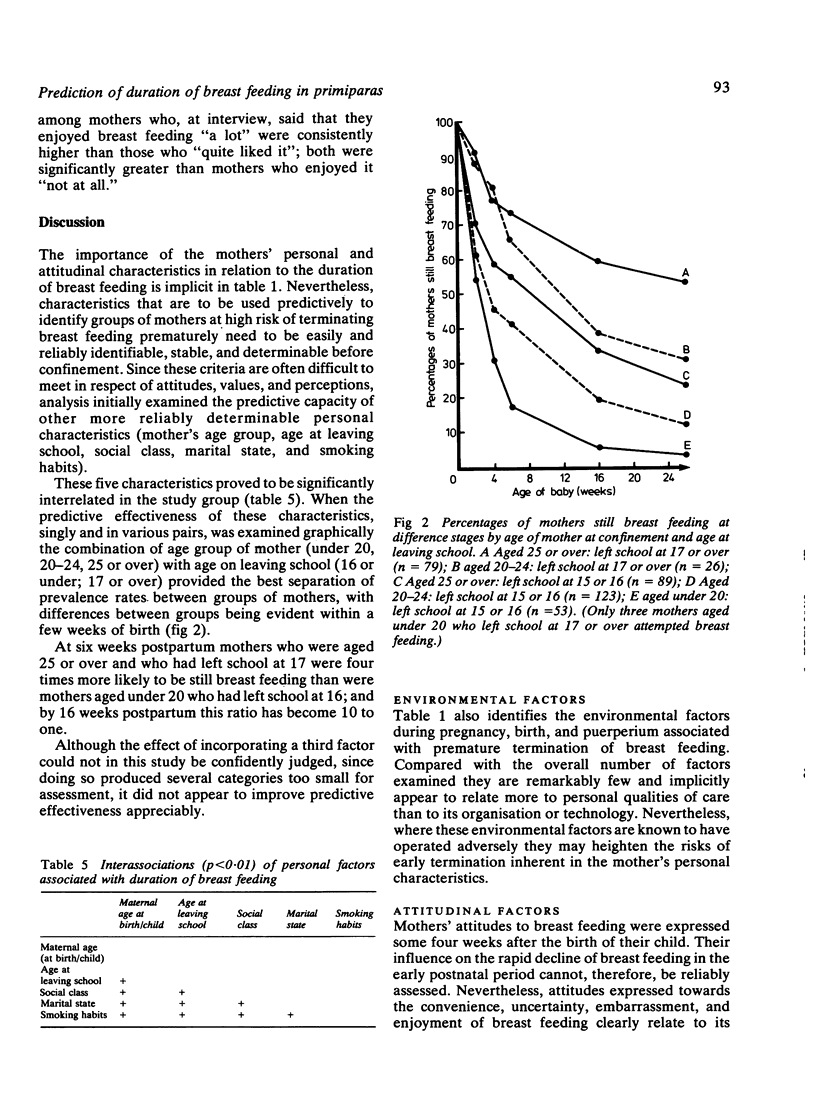
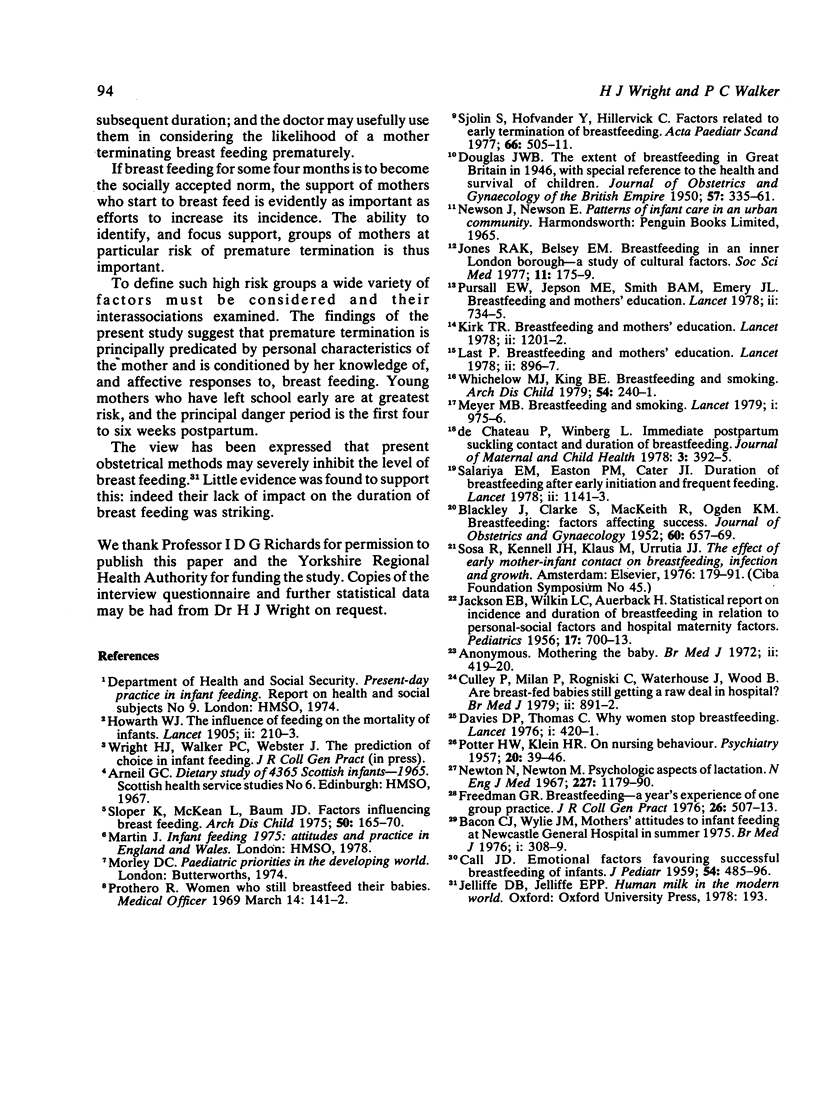
Selected References
These references are in PubMed. This may not be the complete list of references from this article.
- BLAIKLEY J., CLARKE S., MACKEITH R., OGDEN K. M. Breast-feeding; factors affecting success; a report of a trial of the Woolwich methods in a group of primiparae. J Obstet Gynaecol Br Emp. 1953 Oct;60(5):657–669. doi: 10.1111/j.1471-0528.1953.tb07255.x. [DOI] [PubMed] [Google Scholar]
- Bacon C. J., Wylie J. M. Mothers' attitudes in infant feeding at Newcastle General Hospital in summer 1975. Br Med J. 1976 Feb 7;1(6005):308–309. doi: 10.1136/bmj.1.6005.308. [DOI] [PMC free article] [PubMed] [Google Scholar]
- CALL J. D. Emotional factors favoring successful breast feeding of infants. J Pediatr. 1959 Oct;55:485–496. doi: 10.1016/s0022-3476(59)80286-9. [DOI] [PubMed] [Google Scholar]
- Culley P., Milan P., Roginski C., Waterhouse J., Wood B. Are breast-fed babies still getting a raw deal in hospital? Br Med J. 1979 Oct 13;2(6195):891–893. doi: 10.1136/bmj.2.6195.891. [DOI] [PMC free article] [PubMed] [Google Scholar]
- Davies D. P., Thomas C. Letter: Why do women stop breast feeding? Lancet. 1976 Feb 21;1(7956):420–421. doi: 10.1016/s0140-6736(76)90245-2. [DOI] [PubMed] [Google Scholar]
- Douglas J. W. The extent of breast feeding in Great Britain in 1946, with special reference to the health and survival of children. J Obstet Gynaecol Br Emp. 1950;57:335–361. [PubMed] [Google Scholar]
- Freedman G. R. Breast feeding--a year's experience of one group practice. J R Coll Gen Pract. 1976 Jul;26(168):507–513. [PMC free article] [PubMed] [Google Scholar]
- JACKSON E. B., WILKIN L. C., AUERBACH H. Statistical report on incidence and duration of breast feeding in relation to personal-social and hospital maternity factors. Pediatrics. 1956 May;17(5):700–715. [PubMed] [Google Scholar]
- Jones R. A., Belsey E. M. Breast feeding in an inner London borough--a study of cultural factors. Soc Sci Med. 1977 Feb;11(3):175–179. doi: 10.1016/0037-7856(77)90090-7. [DOI] [PubMed] [Google Scholar]
- Kirk T. R. Breast-feeding and mother's education. Lancet. 1978 Dec 2;2(8101):1201–1202. doi: 10.1016/s0140-6736(78)92183-9. [DOI] [PubMed] [Google Scholar]
- Last P. Breast-feeding and mother's education. Lancet. 1978 Oct 21;2(8095):896–897. doi: 10.1016/s0140-6736(78)91607-0. [DOI] [PubMed] [Google Scholar]
- McKean K. S., Baum J. D., Sloper K. Factors influencing breast feeding. Arch Dis Child. 1975 Mar;50(3):165–170. doi: 10.1136/adc.50.3.165. [DOI] [PMC free article] [PubMed] [Google Scholar]
- Meyer M. B. Breast-feeding and smoking. Lancet. 1979 May 5;1(8123):975–976. doi: 10.1016/s0140-6736(79)91746-x. [DOI] [PubMed] [Google Scholar]
- Newton N., Newton M. Psychologic aspects of lactation. N Engl J Med. 1967 Nov 30;277(22):1179–1188. doi: 10.1056/NEJM196711302772205. [DOI] [PubMed] [Google Scholar]
- POTTER H. W., KLEIN H. R. On nursing behavior. Psychiatry. 1957 Feb;20(1):39–46. doi: 10.1080/00332747.1957.11023074. [DOI] [PubMed] [Google Scholar]
- Prothero R. Women who still breast-feed their babies. Med Off. 1969 Mar;121(11):141–142. [PubMed] [Google Scholar]
- Pursall E. W., Jepson M. E., Smith B. A., Emery J. L. Breast-feeding and mother's education. Lancet. 1978 Sep 30;2(8092 Pt 1):734–735. doi: 10.1016/s0140-6736(78)92730-7. [DOI] [PubMed] [Google Scholar]
- Salariya E. M., Easton P. M., Cater J. I. Duration of breast-feeding after early initiation and frequent feeding. Lancet. 1978 Nov 25;2(8100):1141–1143. doi: 10.1016/s0140-6736(78)92289-4. [DOI] [PubMed] [Google Scholar]
- Sjölin S., Hofvander Y., Hillervik C. Factors related to early termination of breast feeding. A retrospective study in Sweden. Acta Paediatr Scand. 1977 Jul;66(4):505–511. doi: 10.1111/j.1651-2227.1977.tb07935.x. [DOI] [PubMed] [Google Scholar]
- Sosa R., Kennell J. H., Klaus M., Urrutia J. J. The effect of early mother-infant contact on breast feeding, infection and growth. Ciba Found Symp. 1976;(45):179–193. doi: 10.1002/9780470720271.ch11. [DOI] [PubMed] [Google Scholar]
- Whichelow M. J., King B. E. Breast feeding and smoking. Arch Dis Child. 1979 Mar;54(3):240–241. doi: 10.1136/adc.54.3.240-a. [DOI] [PMC free article] [PubMed] [Google Scholar]



